#political cinema
Text

Colonia directed by Florian Gallenberger
70 notes
·
View notes
Text
Thinking about the best movie that came out this year and this image came to me.
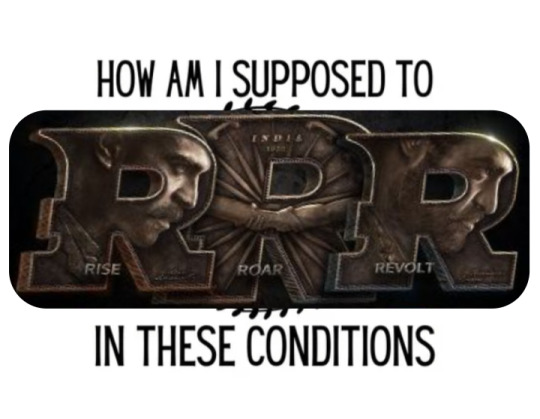
#RRR#Rise Roar Revolt#film#cinema#best movie#movie#Indian Cinema#s.s. rajamouli#action cinema#political cinema
133 notes
·
View notes
Text
Case of the Naves Brothers (1967, feature film)
youtube
5 notes
·
View notes
Text
Unveiling the Layers of "Ae Watan Mere Watan": Beyond its Cinematic Shortcomings
In the world of cinema, there are occasional gems that manage to shine through despite their apparent flaws. "Ae Watan Mere Watan" falls into this category, offering a narrative that transcends its lackluster execution to deliver powerful political messages. Let's delve into the depths of this film, exploring its portrayal of pressing issues such as press freedom, generational divides, and the struggle against ingrained conservatism.
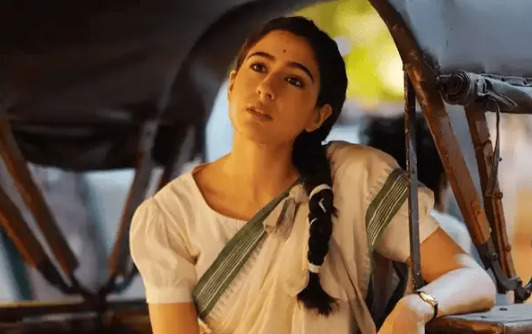
At its core, "Ae Watan Mere Watan" serves as a tribute to the spirit of Usha Mehta, a pivotal figure in India's Independence movement. While the film may not excel in direction or performances, it boldly confronts the toxic propaganda prevalent in today's political landscape. Despite its shortcomings, the movie stands as a beacon of progressive thought amidst a sea of regressive narratives.
One of the film's strengths lies in its exploration of press freedom during authoritarian times. Inspired by Usha Mehta's involvement in founding the underground Congress Radio, the narrative sheds light on the importance of disseminating information in challenging political climates. In a world where media freedoms are increasingly under threat, "Ae Watan Mere Watan" serves as a timely reminder of the vital role journalists play in upholding democratic values.
Furthermore, the film delves into the theme of generational conflict, a topic that resonates with many viewers. Through Usha's strained relationship with her conservative father, the audience is confronted with the reality of youth rebelling against the ideologies of the older generation. Despite some stilted dialogue, the film manages to capture the essence of this struggle, presenting it as a timeless and relatable narrative.
Additionally, "Ae Watan Mere Watan" challenges blind faith and celebrates the role of women in the freedom struggle. By portraying Gandhi in a flattering light and highlighting Usha's resilience in a male-dominated society, the film breaks away from conventional narratives and offers a refreshing perspective on historical figures and events.
In a cinematic landscape often dominated by superficial narratives, "Ae Watan Mere Watan" dares to tackle complex themes with sincerity and depth. While it may not be without its flaws, the film succeeds in sparking conversations about the pressing issues facing society today.
In conclusion, "Ae Watan Mere Watan" may not be the most polished film, but its underlying messages are powerful and thought-provoking. As we reflect on its portrayal of press freedom, generational divides, and the fight against conservatism, we are reminded of the enduring relevance of cinema as a tool for social commentary and change.
0 notes
Text
Thinking Aloud About Film: Soleil Ô/ Oh Sun (Med Hondo, France, 1970)
Thinking Aloud About Film: Soleil Ô/ Oh Sun (Med Hondo, France, 1970)
The Criterion Collection calls SOLEIL Ó/ OH, SUN , ‘A furious cry of resistance against racist oppression and a revolutionary landmark of political cinema’. The Celluloid Liberation Front, writing for MUBI, calls it ‘one of the most dazzling debuts in the history of cinema’; ‘A work of erudite formalism and incendiary refinement’; ‘never didactic’. We dispute all of this. The film is definitely,…

View On WordPress
#France#Med Hondo#Mubi#Oh Sun#Political Cinema#Revolutionary Cinema#Soleil O#The Criterion Channel#Thinking Aloud About Film
0 notes
Text

#writers strike#actors strike#Hollywood#movies#cinema#killer whales#orca#fuck them yachts#whales#animals#politics#bob iger#Disney
740 notes
·
View notes
Text

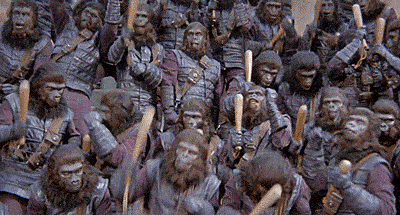
#funny#lol#gif#planet of the apes#movies#humor#politics#retro#memes#films#cinema#hilarious#government#haha#us politics#donald trump#Democrats#Republicans#democracy#beauty-funny-trippy#trump rally
235 notes
·
View notes
Text



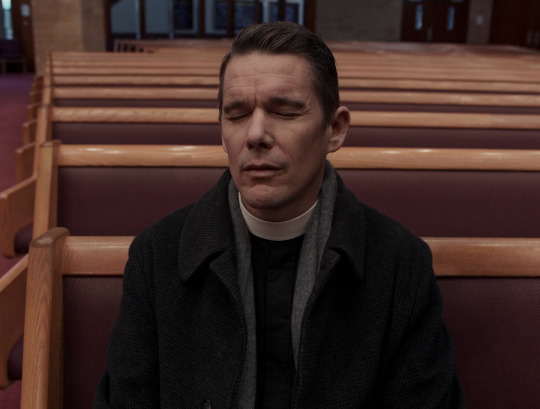
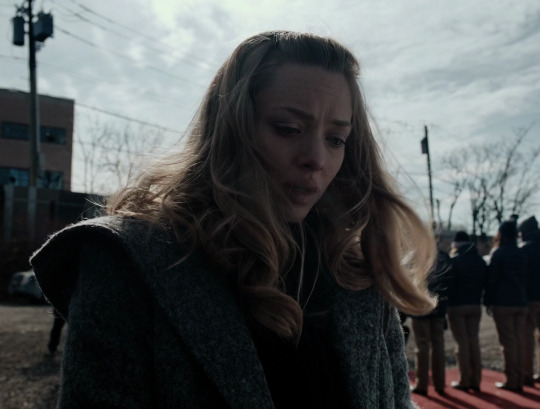

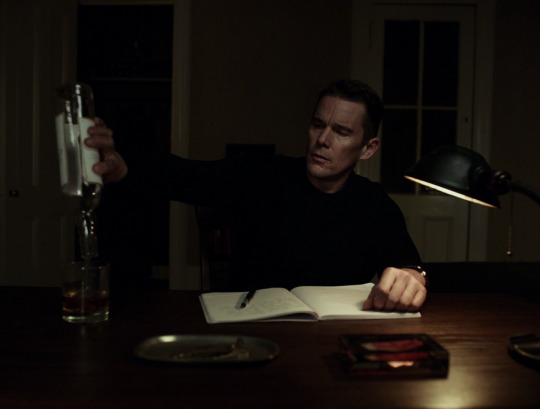



First Reformed (Paul Schrader, 2017)
#films watched in 2023#First Reformed#Ethan Hawke#Paul Schrader#Schrader#2017#Amanda Seyfried#drama#religion#ocho#church#independent cinema#politics#alcohol#drink#alcoholism
325 notes
·
View notes
Text

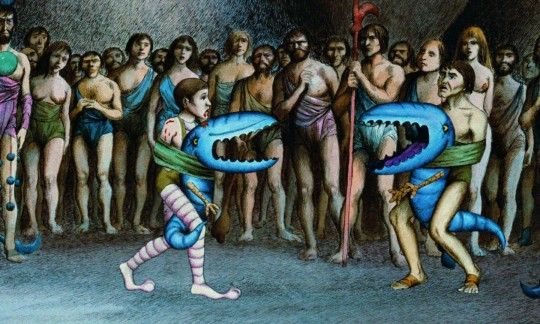

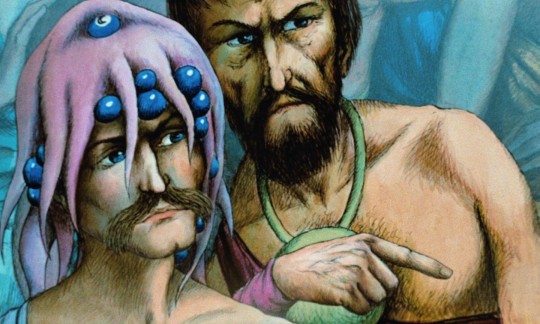
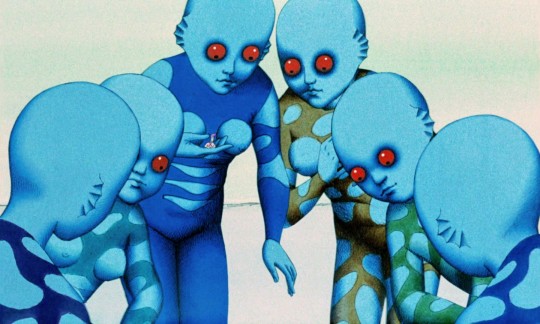
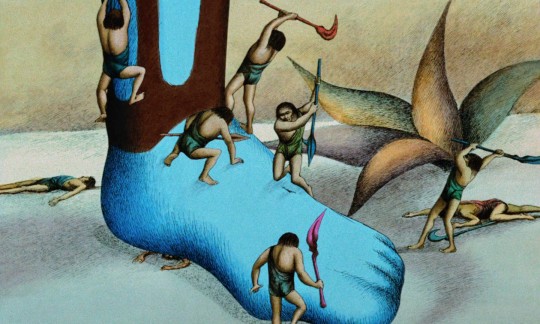

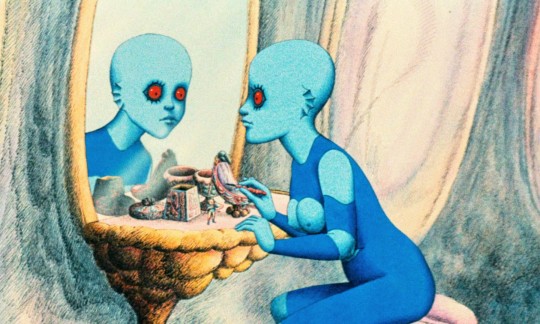
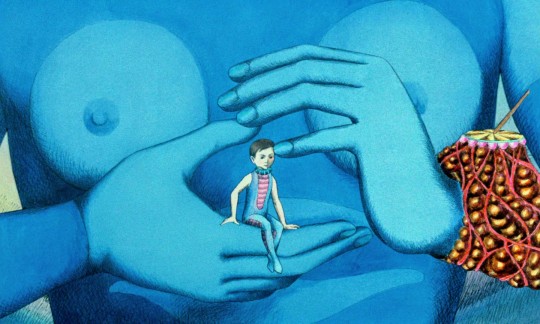

Fantastic Planet (1973)
#sci fi#animation#1970s#movies#art history#film#fantastic planet#fantasy#science fiction#cinema#retro#alien#cartoon#futuristic#dystopia#dark#surreal#horror#society#politics#🎨 📚
243 notes
·
View notes
Text
Poor Things and Born Sexy Yesterday
(spoilers for Poor Things)
I stumbled on a discussion on whether Bella Baxter from the movie Poor Things (2023) is a representation of the Born Sexy Yesterday trope coined by video essayist Pop Culture Detective, who defines it as a mostly fantasy and sci-fi adjacent trope of a regular human man falling in love with a beautiful, otherworldly woman who, through some plot quirk or another, has no knowledge of social norms and no sexual or romantic past. Even though he is brutally average, he is able to win her love simply because he is the first (human) man she connects with and thus everything that's basic about him is impressive to her. Some examples of the trope given by Pop Culture Detective in his video essay are Leeloo from Fifth Element (the physically grown yet mentally child-like alien creature who falls in love with a taxi driver in a wifebeater) and Madison from Splash (a clothes-aversive mermaid who thinks that Tom Hanks is the most enchanting man in the world).
I love Pop Culture Detective's work, and the Born Sexy Yesterday video essay was a cultural reset in my personal history. I saw the video when it premiered six years ago, but it has never fully left my mind, so of course I immediately thought of it when I saw Poor Things a couple of weeks ago. The movie certainly touches on the same themes that the Born Sexy Yesterday is made of. However, I think that the movie is an intentional subversion and a satire of the trope rather than a sincere execution of it.
The main character of the movie Bella Baxter starts out as a grotesquely literal version of the trope, as she is literally a newborn in the shape of a conventionally attractive woman who is being actively shielded from the influence of the outside world. She has the brain of a baby salvaged from the fresh corpse of a deceased pregnant woman, planted inside the skull of the reanimated body of the aforementioned woman as an experiment done by the unorthodox doctor Godwin Baxter. He keeps her locked inside his house and controls every aspect of her life, so when he invites the young doctor Max McCandles to join his research, McCandles is served what is essentially the perfect Born Sexy Yesterday experience: an exclusive access to a beautiful and naive young woman who is in a prime position of being groomed into whatever her keepers wish her to become.
Or so they would think.
A sincere Born Sexy Yesterday would be fully fascinated by this power dynamic and probably leave her here to be romanced by McCandles for the rest of the film. The audience would be expected to assume McCandles's perspective and indulge in the fantasy of falling in love with the untainted woman who has neither the life experience nor the critical thinking skills needed to question him.
But, fortunately, the movie doesn't remain here. After the first act, the movie switches its point of view from McCandles to Bella and starts putting her experiences to the forefront. She starts developing interests that absolutely do not align with the wants and needs of the men around her, and she begins to learn things that clash with the essence of the Born Sexy Yesterday trope. Soon, she has grown into a headstrong, independent, sexually experienced, intellectually curious woman who had zero interest in entertaining the whims of men and who intends to live fully for herself and herself alone: an absolute antithesis of the clueless and subservient blank slate the trope would require her to be.
My reading of the film is that it's an intentional satire and an autopsy of the BSY trope and the gender politics that gave birth to it. It criticizes the men who entertain fantasies like it by making them look like absolute losers, urging us to ponder on what the hell is wrong with these creeps who see nothing wrong with drooling over a woman who is mentally a toddler instead of their intellectual equal.
The movie also reads as a critique of how women are socialized into a patriarchy. Godwin treats Bella just like a possession of his. Her body and her life are completely under his control from the moment she is "born" (another act in which neither Bella nor the woman she was born from had any say in), which isn't dissimilar to how a lot of fathers view their daughters. He wishes to keep her under constant supervision until the end of her life, until she protests and gets him to change his mind. When he asks McCandles to marry her, the two men treat the proposed marriage as a contract between the two of them rather than as a contract between McCandles and Bella herself. Again, this isn't too different to what marriage between men and women has meant throughout history.
McCandles is romantically interested in Bella even though he is fully aware of the fact that she is mentally a child. He seems to be looking forward to starting a sexual relationship with her after they are wed, as if the seal of marriage would make the intellectual disparity between them any less iffy. This bears resemblance to the way men in the real world prey on young girls with little to no sexual experience and whose brains are not fully developed because they're easier to control than grown women. I don't think that McCandles's hypocrisy is lost on the film. He agrees to marry Bella almost in the same breath as expressing his desire to keep her safe from other men, as if his desire to bed a person who is intellectually at the level of a five-year-old was any better than theirs.
When Bella chooses to leave Godwin's house to explore the world, the two men immediately replace her with a new experiment, showing that they were never truly interested in her as a person. They wanted the eternal baby, the thing that they can cage and control, and not the person who can think and learn and disagree with them. This exemplifies how disposable women are when they no longer serve their limited purpose in a patriarchy, and how replaceable people are when they are primarily viewed as bodies to be used.
(Sidenote: I do think that Godwin and McCandles eventually learn to appreciate Bella for the person she is and that they both grow to be better people by the end of the film, but I still attest that these two are total creeps at least by this point of the movie.)
And then there's the supreme loser of the movie: the sleazy lawyer Wedderburn, who slithers into Bella's life and convinces her to run away with him. He is the darkest example of the kind of person who is drawn to inexperienced women like the ones represented in BSY movies - a predator who finds pleasure in the prospect of getting to corrupt and consume an innocent. He intends to take advantage of Bella and abandon her once he's gotten his fill only to find himself choking on his prey, who turns out not to be the malleable, naive creature he thought her to be.
This is the point where I think the movie goes from simply critiquing the BSY trope and everything it represents to successfully subverting it. The characters who embody the BSY trope don't really evolve. The movies they appear in are not really interested in their inner worlds and individual experiences beyond whatever serves the interests of the male protagonists. These characters are projections of male fantasies, so there really isn't a way for them to exist without centering men. This is not the case with Bella, who quickly grows into her own woman who is only tangentially interested in the men around her.
The bright side of Bella's condition is that she isn't just unaware of the ways of the world, but that she's also unaffected by the years of patriarchal conditioning that most normal women are burdened with. She literally has no shame, no internalized misogyny, no history of crushing blows to her sense of self-worth, and no looming knowledge of societal norms society. She has skipped the part in life where she is constantly bombarded with demands to make herself smaller and more palatable, to hate herself, to think of her body and the way it finds pleasure as something disgusting and abnormal, to treat other women as competition, and to think of herself as so much less important than men that she must pursue their validation beyond all else. Because of this blessed defect, she is free in a very rare way.
Wedderburn absolutely cannot handle that. When Bella first gets to know him, he paints a flattering picture of himself as a proud social deviant who gleefully eschews the rules of polite society. However, when faced with the actually deviant Bella, who flatly refuses to obey and center him, Wedderburn is revealed to be a phony. He is not a genuine libertine. He does not want to live in a truly free world with a free spirit like Bella, because he is a pathetic, insecure little man who only likes women in scenarios where the power balance is stacked against them. In my opinion, this is a direct shot fired at the BSY trope and its average enjoyers: if your ideal woman is someone who is many steps behind you in terms of mental capacity and experience, you are quite pitiful and would not stand a chance in an equal playing field.
It's hilarious how Wedderburn loses his mind when Bella starts exhibiting the kind of behavior he himself has proudly displayed earlier in the film: having multiple sexual partners, keeping sex and feelings separate, not falling in love with him or treating him like he's special, dropping him once she's had enough of him, and generally living life in an unconventional way. Again, the movie is pointing out the hypocrisy in men who fetishize inexperienced women while bragging about their own sexual conquests.
The part in the movie where Bella becomes a sex worker delivers the final blow to whatever is left of the BSY trope in her story, because the trope relies on sexual exclusivity and the fetishization of virginity. By having many partners and gaining lots of sexual experience out of her own free will, Bella stops fitting the ideal of the untouched woman who can be deflowered and exclusively possessed by the male protagonist. Also, through the conversations between Bella and the other sex workers, the movie finds another way to address the politics behind certain men's sexual fantasies of women - such as pointing out that some men enjoy sex with women more the less the women themselves enjoy it. It's a stray observation that the movie doesn't get deep into, but it has its place in the tapestry of the general theme of what desire reveals about people.
Finally, there's Alfie, who gives Bella (and us) an idea of the kind of life Bella's "mother" lived - as well as the kind of life Bella herself might be living had she grown up the normal way. It seems hellish. She'd be living under the tyranny of her awful husband, under a constant threat of violence, under absolute bodily control. Alfie wants to impregnate her against her will and to mutilate her genitals to deprive her of pleasure, and there's nothing that she could do about it because he is her husband and thus legally allowed to lord over her. She sees a terrifying glimpse of the role even privileged women like her have in this world: objects who exist solely for the pleasure of the men who own them. I would venture to say that the same description lies in the underbelly of the BSY trope.
I am happy that the movie doesn't take its sweet time to revel in the horror of this part of the story like so many other movies that address the oppression of women do. Instead, Bella stays with Alfie just enough time to say a hard and a well-informed no to his bullshit before getting on her merry way.
I think Poor Things is such a great example of taking a trope and exploring its implications in a way that goes beyond just pointing it out or parodying it by simply repeating it.
#poor things#yorgos lanthimos#bella baxter#emma stone#born sexy yesterday#pop culture#tropes#feminism#gender politics#movies#cinema#film#film studies
139 notes
·
View notes
Text
Dozens of Toronto residents are now boycotting Home Hardware due to the company's "engagement" with a specific advertising company that advocates claim "lock out unionized performers."
In a recent post to a local community Facebook group, one Toronto resident informed other members that the home improvement retailer was one of the companies named on ACTRA's (Alliance of Canadian Cinema, Television and Radio Artists) boycott list.
"Did you know that Home Hardware is on a boycott list issued by ACTRA, the union of Canadian performers on TV and film? Why? Because they buy their ads from a company that has locked out unionized performers for the last year in an attempt to break the union," the post reads.
[...]
Other companies listed on the ACTRA lockout include H&R Block, Canadian Tire, Rogers, Wendy's, and Sleep Country.
Full article
Tagging: @allthecanadianpolitics
#cdnpoli#canadian news#canadian politics#canada#mine#boycott#boycotts#workers rights#unions#home hardware#H&R block#canadian tire#wendy's#rogers#sleep country#union busting#ACTRA#alliance of canadian cinema television and radio artists#toronto#ontario
250 notes
·
View notes
Text
Dead Poets Society directed by Peter Weir
20 notes
·
View notes
Note
people saying, oh it wasn't intended from the beginning so it wasn't intentional thus has to stay fanfiction bug me. like, shows can develop organically based on chemistry. they can surprise you and take you in a direction that wasn't planned but now just works. like, fucking, chandler and monica wasn't planned from the beginning! but the actors had chemistry and the writers tried it out and it became iconic. you don't throw something away just because it surprised you instead of being pre-planned; you cultivate whatever gold you find!
With Hollywood entertainment in particular, I think there is a lot of ignorance regarding how the creative process, production process, post-production process, and business all work. It is readily apparent that in Hollywood, there are many hands in the kitchen when it comes to creating a movie, documentary, or show. The "Original Intent" argument is weakest when it comes to Hollywood art, and in fact fails to be a viable argument in multiple areas. I will discuss how the "Original Intent" argument fails in Hollywood in more depth under the read more, using what I know from having worked in the industry myself as a writer. And to be honest, the fact I have to pull my private professional history out online, just to prove I'm not being delulu when it comes to the importance of queer subtext in film, pisses me the fuck off.
To be clear, since this whole discourse mess on my Tumblr is likely the result of someone thinking I'm an anti-sylki: I AM NOT AN ANTI. I have an extensive analysis on Sylvie as an integral character to the Loki series, Sylki in canon, and her relationship with Mobius here.
I agree with you: a lot of amazing art deviates from the original intention, especially writing. If deviating from original intent in the writing process did not exist, we would not have DRAFT REVISIONS, we would not have IMPROV, we would not have EDITORS (whose entire job hinges on giving the writer not only grammar corrections, but feedback on how to IMPROVE character, plot, and pacing, which inherently means making changes from the original intent!). This is to say nothing of the thousands, if not tens or hundreds of thousands, of media scholars--with actual PhDs--who spend years of their lives performing meta-analysis to write academic papers on subject matters like this. Papers that become formal publications and contribute to how queer history is taught in universities! This is no different than academic scholars analyzing women and race representation and resistance in film. Why should analyzing queer representation and resistance in film be treated any less?
LET'S TALK ABOUT ORIGINAL CREATIVE INTENT VS POWER HIEARCHY & POLITICS IN HOLLYWOOD
For context with respect to this ask, a different Tumblr user critiqued against queer subtext in one of my posts using the "original intent" argument for the Loki series and Lokius specifically. By this logic, if original intent is always honored, then the original script for Loki's S2E5 (written by Eric Martin) would not have been NUKED by the executive powers that be at Marvel. [source] But no, the original intent was not honored, it was rejected. So how does one square the primacy of original intent with original intent being rejected by people who are not the artist but the people who manage Disney's finances?
In television, "Executive Producer" (i.e. Tom Hiddleston, Michael Waldron, Eric Martin, etc.) is a title that can be given to a writer or actor who has more creative say in the execution of a story than a regular staff writer or actor on crew. It also indicates that the writer or actor is in a much higher salary range compared to their professional peers. It does NOT mean the same thing as a CORPORATE "Producer" of Kevin Feige's level, who ultimately has the FINAL SAY on what does NOT end up on the cutting room floor. The corporate Producer must take into account the wishes of corporate's shareholders and board of directors, who are often multi-million if not multi-billion global investors who need the distribution of the product to succeed internationally in countries like China, which is very anti-LGBTQAI+. This is how a script like Eric Martin's S2E5 can be nuked and the writer can be contractually gagged from talking about its specific contents by Disney, lest they be SUED TO HELL for breaking their non-disclosure agreements (NDAs).
This doesn't even take into account politics.
In 2020, Ike Perlmutter, Chair of Marvel, "gave $575,000 to Trump For Victory, $35,500 to the Republican National Committee in April, $5600 for Texans For Ronny Jackson in February. 2019 saw him donate $248,000 to the Republican National Committee, $466,100 to Trump For Victory, $5,600 to Donald Trump For President." His wife, Laura, mirrored those donations. "In late 2016, he also gave $5,000,000 to the Great America PAC." [source] Ike was only recently laid off from his position in March 2023 [source]. Perlmutter was in a power-struggle at Marvel with Kevin Feige for years. Feige was promoted to Chief Creative Officer in 2019, which brought the power struggle to a head, ultimately contributing to Perlmutter's departure.
There is also Bob Iger, CEO of Disney, who was famously quoted during the Writers Guild of America strike for saying, “It’s very disturbing to me. We’ve talked about disruptive forces on this business and all the challenges we’re facing, the recovery from COVID which is ongoing, it’s not completely back. This is the worst time in the world to add to that disruption”
This is the worst time in the world to negotiate to pay your writers, YOUR CREATIVE LABOR FORCE, who entertained millions of people while they were stuck in their homes for 2 years, fairly?
And these are just two men in executive power at Marvel and Disney. We're not even talking about all the other board members and shareholders. You think Tom Hiddleston, Michael Waldron, and Eric Martin have any real power compared to these guys? They do not. They are peons by comparison. And these artists (despite their "Executive Producer" title) are always at odds with the Alliance of Motion Picture and Television Producers (AMPTP), who are ultimately not artists but FINANCIERS.
Here's another quote from a studio executive that occurred during the writer's strike:
"Receiving positive feedback from Wall Street since the WGA went on strike May 2, Warner Bros Discovery, Apple, Netflix, Amazon, Disney, Paramount and others have become determined to “break the WGA,” as one studio exec blatantly put it.
To do so, the studios and the AMPTP believe that by October most writers will be running out of money after five months on the picket lines and no work.
“The endgame is to allow things to drag on until union members start losing their apartments and losing their houses,” a studio executive told Deadline. Acknowledging the cold-as-ice approach, several other sources reiterated the statement. One insider called it “a cruel but necessary evil.”" [source 1] [source 2]
Fortunately, this negative press and the WGA members' solidarity led to the WGA getting everything they demanded. I still have friends in the industry, specifically in the WGA and MPEG. A lot of them were indeed starved out. My friend who's a film editor is still unemployed because pre-production has only recently started to ramp up again and her profession is all in post. She has to wait for production to catch-up and finish in order to get work.
If the AMPTP is willing to use clearly unethical tactics to underpay their writers and actors (don't forget the SAG-AFTRA strike that joined later), do we really think members of the AMPTP (the studio execs) are willing to honor artists' original intent if the original intent may be "offensive to some viewers" and therefore can potentially cut into their financial bottom line?
We're not naive. We know the answer to this.
OUR FLAG MEANS DEATH, KILLING EVE, AND GOOD OMENS
But what about OFMD, KE, and GO? These shows are on MAX, BBC, and Amazon Prime respectively. These corporations have a different branding image than Disney. Disney touts itself as "family friendly"; (read: on-screen LGBTQAI+ affection between two lead characters is "not family friendly"). MAX and BBC's branding type also affords them the luxury of creating content for niche audiences. Disney, on the other hand, makes additional revenue through using their plethora of licenses to make toys, additions to their theme parks, and other merch. If a parent is offended that a canonically queer character like Loki has romantic love not just for Sylvie but also for Mobius (a same-sex relationship), what are the odds of parents like them not buying Disney's merchandise? We can apply this same question to Star Wars, Pixar, and any of Disney-branded animation or live action movies. How deeply can audience offense potentially cut into Disney's bottom line? If there were no discrimination taking place, we would have LGBTQAI+ representation through a lead character in any one of their licenses already. We do not, and that is a huge red flag.
In addition, these entertainment corporations (who do not tout themselves as "family friendly") generate other sources of revenue elsewhere. Netflix generates international revenue through the production of international programming like "Squid Game" and other K-dramas such as "The Glory" or Mexican shows including, "The Surrogacy" and "Haunted: Latin America". MAX is struggling. They were bought out for that reason. With AppleTV and Hulu, their target audiences are more diverse, they offer a variety of media product, and their business strategy is ultimately different from Disney. All of this grants them more freedom in what kind of characters they choose to represent, including LGBTQAI+ characters.
Remember House and Wilson from House M.D.? That show was on FOX. We know the political alignment of FOX. Dean and Castiel from Supernatural? WB Television. Both shows came out before streaming became dominant, and thus, these shows had to cater to anyone who might happen to land on their channels. When the market demands that you cater to the widest possible audience in order to generate the largest revenue, the creatives are forced to create relatively conservative artistic product. Hence, creative censorship and our long history of queer subtext.
At Nickelodeon, the artists actually had the support of corporate to move forward with Korrasami because the final season Legend of Korra was only available online. It did not air on their channel. If that had not been the case, corporate would not have approved Korrasami. However, that approval was contingent upon the artists being subtle subtle about Korra and Asami's relationship. Even in this canon ship, the animators relied on subtext for queer romance.
Not helping Disney's case is the cancellation of "The Owl House". Why was "The Owl House" canceled? It didn't fit Disney's "brand". [source]
THE FAILURES OF THE "ORIGINAL INTENT" ARGUMENT IN HOLLYWOOD
The "Original Intent" argument fails when it comes to art in Hollywood because:
Original Intent can change, and often does change, during the creative process. This applies to all forms of art, not just Hollywood.
Multiple artists are involved in pre-production, production, and post-production. At any point in this 3-part process of filmmaking, original intent can be changed for a variety of reasons.
Studio Executives, Boards of Directors, and Corporate Shareholders have more power than the artists in Hollywood. If they think a product will not make money, they will order changes accordingly.
Disney specifically touts itself as "family friendly". Its lack of a lead character (in ANY of its live-action licenses) being in an openly queer relationship with someone who presents as the same sex, is the direct result of not wanting to lose conservative audiences.
Non-Disclosure Agreements (NDAs) are common in Hollywood and prevent artists from providing specifics regarding original intent. This is done not only to safeguard corporate's intellectual property (IP), but to also safeguard their public relations image.
THE ORIGINAL INTENT ARGUMENT WEAPONIZED
The "original intent" mindset can be either very naive or very cynical, depending on the thinker's motives for choosing this belief. Naive, in that thinking creative purity actually exists (it does not) or that oppression does not still occur in Hollywood (it does). Cynical, in that either the thinker doesn't believe in artists intentionally finding ways around mass produced arts' media censorship, which has in turn created our rich history of queer subtext in film, OR the thinker wants the "original intent" argument to invalidate a change they do not like.
The last motive is the same strategy used by fans who reject Miles Morales as being a real Spider-Man. The same strategy fans use to deny that Shuri is indeed the new Black Panther. Both are tactics used to mask racism and sexism beneath the veneer of "creative purity". Fans who have internalized racism, sexism, or queer-phobia may also use this tactic at a subconscious level to protect themselves emotionally from disappointment. Finally, there are fans who use this argument to invalidate another ship, usually a queer ship that cannot be formally canonized because of corporate studio power.
Regardless of the reasoning, using this argument is frequently insidious because it perpetuates straight white male dominance in media representation.
PERSONAL LIVED EXPERIENCE
I'm an old poc queer and have worked in Hollywood long enough to know that the writers' original vision rarely ever--IF EVER--pans out as originally intended. If you ever sit through a movie and wonder why the story feels so weird in certain parts, I can guarantee you that about 2/5ths of the time, a corporate producer stepped in and messed with the original story in post-production (usually in an poor, over-worked editor's dark editing bay) and ordered reshoots the director may not have agreed with.
I've also worked in the industry long enough to know that it is an absolutely toxic work environment in which women, people of color, and queer people still struggle to get a creative foothold anywhere. My first experience pitching a script to a prospective agent involved being asked to meet at a hotel for drinks. We didn't talk about my writing at all. What I thought would be a pitch meeting was actually the writer's version of the "Hollywood casting couch". Yes, I was propositioned. No, nothing happened to me. I walked out. This happened to me in June 2008. It was not my last experience. The "Me Too" movement that came years later in 2017 was in response to situations I have encountered like this.
Those of us who succeed are very rare, and 97% of the time, the executive staff is very, very white and male. There is absolutely oppression and exploitation of all sorts still happening in Hollywood. I fucking lived it and continue to have nightmares about it.
QUEER SUBTEXT STILL EXISTS
Thus, to deny queer subtext's validity as an art form and to only accept the words of those who are either in power or limited in what they can say because of those in power, undermines not only the artists' efforts to tell the story they want to tell but cannot tell explicitly, it also undermines queer joy and queer resistance in cinema. And yes, sometimes those artists are cis straight white male allies who want to tell these stories because they simply make sense for the characters. These people are the artists, not the financiers.
It's more mature to embrace, or at least leave alone, the loud joy others experience from shipping and performing meta-analysis instead of publicly pissing on them with the profoundly weak and ignorant argument of "original intent". Don't mess with me on this. The number of scripts I have worked on that completely warped from what I wanted, and then to have my writing credit removed or stolen, still makes me sick. Yes, I'm bitter, but I'm also glad I left.
#loki#mobius#lokius#loki season 2#writing#art#asks#queer cinema#lgbt representation#lgbtqia representation#lgbtqai#lgbtqia#hollywood#politics#entertainment industry#art vs capitalism#capitalism#personal#wga#hollywood industry
76 notes
·
View notes
Text
wow isn't it cool that All Quiet on the Western Front won some Academy Awards in 2023, the same year in which Germany started to ban pro-Palestine protests :) isn't that amazing how we have learnt absolutely nothing?
#so Germans decide to make the most anti-war movie based on the most anti-war book there is and WIN academy awards for the#first time in forever because german cinema is. not. that. good.#and then a literal genocide is going on. war is happening. and gov decides to be a piece of shit#so many people are commenting under news sites on insta and prolly twitter too about the gov's failure and the news keep reporting about#israel but there is barely any coverage for what is happening in Palestine. one look at the comments tells you everything you need to know:#Germans do not support this genocide#I know I am not a politics blog but being against genocide is not political. thats called being a human.#no writing
57 notes
·
View notes
Text

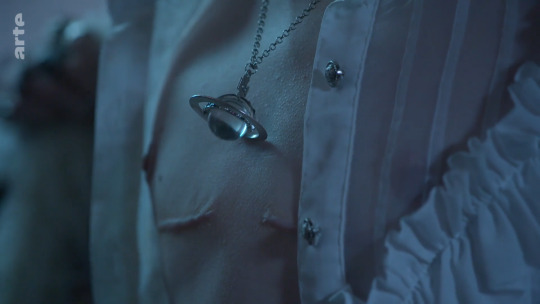

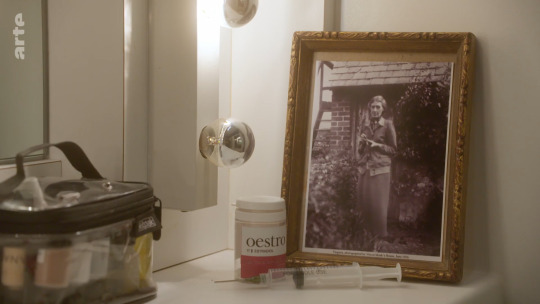
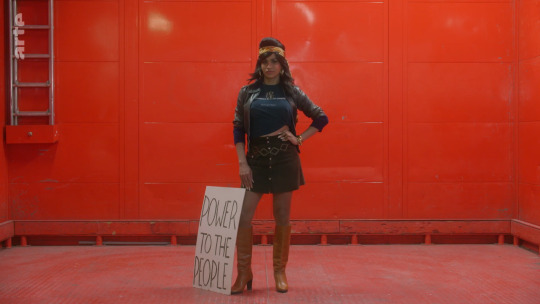
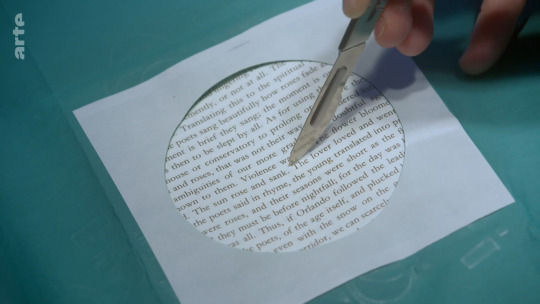
Orlando, My Political Biography (Orlando, ma biographie politique, 2023)
Dir. Paul B. Preciado
#orlando my political biography#orlando ma biographie politique#paul b preciado#paul preciado#2023#c#queer cinema
71 notes
·
View notes
Text
September 11, 1973: On the 50th Anniversary of the Coup in Chile
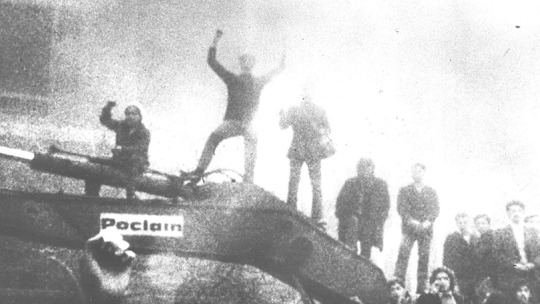
Today marks the 50th anniversary of the coup d’état in Chile, when a fascist junta led by dictator Augusto Pinochet overthrew the democratically elected socialist government of Salvador Allende. For those of us who are on the left, the story should be familiar by now: Allende had charted a ‘Chilean way to socialism' ("La vía chilena al socialismo") quite distinct from the Soviet Union and communist China, a peaceful path to socialism that was fundamentally anti-authoritarian, combining worker power with respect for civil liberties, freedom of the press, and a principled commitment to democratic process. For leftists who had become disillusioned with the Soviet drift into authoritarianism, Chile was a bright spot on an otherwise gloomy Cold War map.
What happened in Chile was one of the darkest chapters in the history of US interventionism. In August 1970, Henry Kissinger, who was then Nixon’s national security adviser, commissioned a study on the consequences of a possible Allende victory in the upcoming Chilean presidential election. Kissinger, Nixon, and the CIA—all under the spell of Cold War derangement syndrome—determined the US should pursue a policy of blocking the ascent of Allende, lest a socialist Chile generate a “domino effect” in the region.
When Allende won the presidency, the US did everything in their power to destroy his government: they meddled in Chilean elections, leveraged their control of the international financial system to destroy the economy of Chile (which they also did through an economic boycott), and sowed social chaos through sponsoring terrorism and a shutdown of the transportation sector, bringing the country to the brink of civil war. Particularly infuriating to the Americans was Allende’s nationalization of the copper mining industry, which was around 70% of Chile’s economy at the time and was controlled by US mining companies like Anaconda, Kennecott and the Cerro Corporation. When the CIA’s campaign of sabotage failed to destroy the socialist experiment in Chile, they resorted to assisting general Augusto Pinochet's plot to overthrow the democratically elected government. What followed was a gruesome campaign of repression against workers, leftists, poets, activists, students, and ordinary Chileans—stadiums were turned into concentration camps where supporters of Allende’s Popular Unity government were tortured and murdered. During Pinochet’s 17-year reign of terror, 3,200 people were executed and 40,000 people were detained, tortured, or disappeared, 1,469 of whom remain unaccounted for. Chile was then used as a laboratory for neoliberal economic policies, where the Chicago boys and their ilk tested out their terrible ideas on a population forced to live under a military dictatorship.
It shatters my heart, thinking about this history. I feel a personal attachment to Chile, not only because my partner is Chilean (his father left during the dictatorship), but because I’ve always considered Chile to be a world capital of poetry and anti-authoritarian leftism. The filmmaker Alejandro Jodorowsky asks, “In how many countries does a real poetic atmosphere exist? Without a doubt, ancient China was a land of poetry. But I think, in the 1950s in Chile, we lived poetically like in no other country in the world.” (Poetry left China long ago — oh how I wish I’d been around to witness the poetic flowering of the Tang era!) Chile has one of the greatest literary traditions of the twentieth century, producing such giants as Bolaño and Neruda, and more recently, Cecilia Vicuña and Raúl Zurita, among others.

To commemorate the 50th anniversary of the coup, the Harvard Film Archive has been screening Patricio Guzmán’s magisterial trilogy, The Battle of Chile, along with a program of Chilean cinema. I watched part I and II the last two nights and will watch part III tonight. It’s no secret that I am a huge fan of Guzmán’s work, and even quoted his beautiful film Nostalgia for the Light in the conclusion of my book Carceral Capitalism, when I wrote about the Chilean political prisoners who studied astronomy while incarcerated in the Atacama Desert. Bless Patricio Guzmán. This man has devoted his life and filmmaking career to the excavation of the Chilean soul.
Parts I and II utterly destroyed me. I left the theater last night shaken to my core, my face covered in tears.


The films are all the more remarkable when you consider it was made by a scrappy team of six people using film stock provided by the great documentarian Chris Marker. After the coup, four of the filmmakers were arrested. The footage was smuggled out of Chile and the exiled filmmakers completed the films in Cuba. Sadly, in 1974, the Pinochet regime disappeared cameraman Jorge Müller Silva, who is assumed dead.
It’s one thing to know the macro-story of what happened in Chile and quite another to see the view from the ground: the footage of the upswell of support for radical transformation, the marches, the street battles, the internal debates on the left about how to stop the fascist creep, the descent into chaos, the face of the military officer as he aims his pistol at the Argentine cameraman Leonard Hendrickson during the failed putsch of June 1973 (an ominous prelude to the September coup), the audio recordings of Allende on the morning of September 11, the bombing of Palacio de La Moneda—the military is closing in. Allende is dead. The crumbling edifice of the presidential palace becomes the rubble of revolutionary dreams—the bombs, a dirge for what was never even given a chance to live.
#Patricio Guzmán#film#Chile#history#salvador allende#socialism#marxism#coup#coup d'etat#The Battle of Chile#revolution#cinema#fascism#communism#geopolitics#political economy#Cold War#chris marker#memory#neoliberalism#capitalism#politics
97 notes
·
View notes